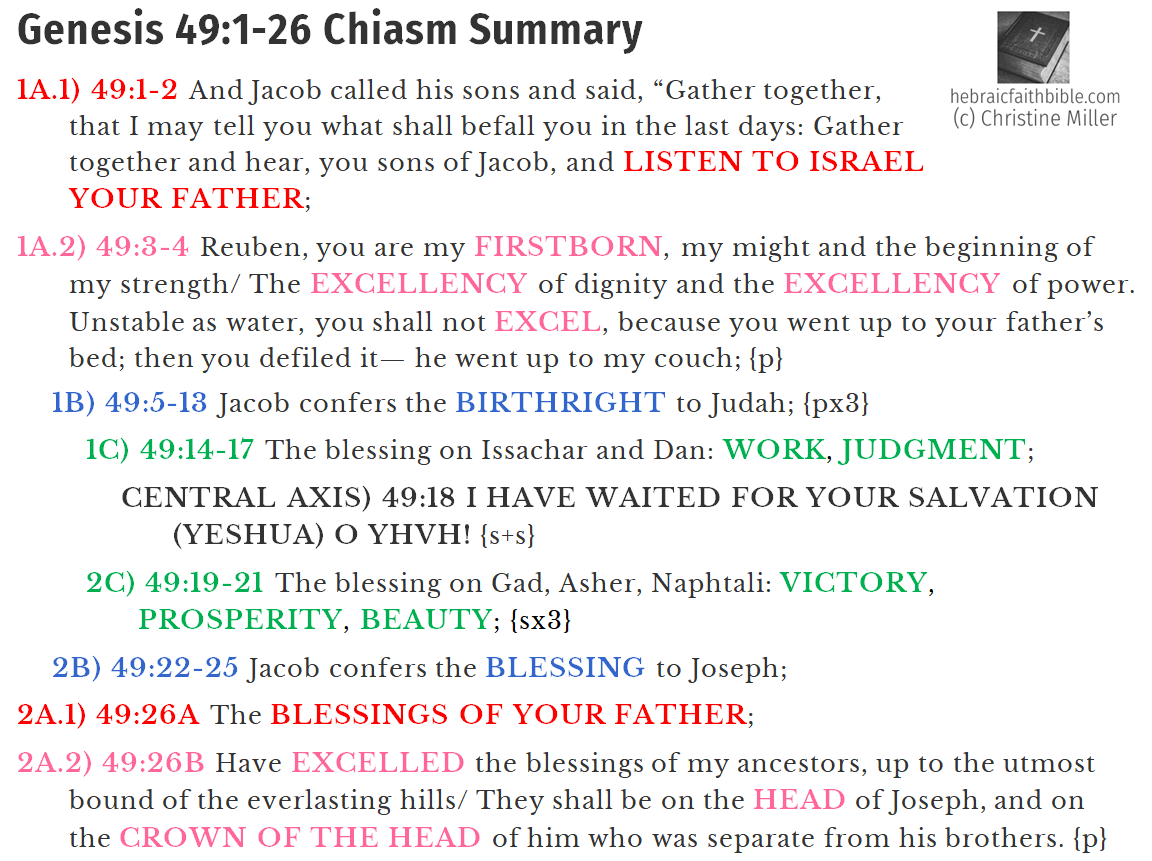Read Genesis 49:1-26 at Bible Gateway.
The teaching tools of scripture
Gen 1:1-2:3 and the teaching tools of scripture part one and part two
Gen 1:1-6:8 and finding the topic themes of scripture
Hebrew paragraph divisions
49:1-4 {p} Reuben’s blessing (of Leah)
49:5-7 {p} Simeon and Levi’s blessing (of Leah)
49:8-12 {p} Judah’s blessing (of Leah)
49:13 {p} Zebulun’s blessing (of Leah)
49:14-15 {s} Issachar’s blessing (of Leah)
49:16-18 {s} Dan’s blessing (of Bilhah, Rachel’s maid)
49:19 {s} Gad’s blessing (of Zilpah, Leah’s maid)
49:20 {s} Asher’s blessing (of Zilpah, Leah’s maid)
49:21 {s} Naphtali’s blessing (of Bilhah, Rachel’s maid)
49:22-26 {p} Joseph’s blessing (of Rachel)
Strong themes of the parashah
48:1-49:13 {px5} Jacob blesses his sons, the sons of Joseph (of Rachel) and Reuben, Simeon, Levi, Judah, Zebulun (of Leah)
49:14-26 {sx6+p} Jacob blesses his sons, Issachar (of Leah), Dan (of Bilhah), Gad, Asher (of Zilpah), Naphtali (of Bilhah), and Joseph (of Rachel)
Genesis 49:1-26 Chiastic structure
Download the fully expanded Gen 49:1-26 Triennial Vayiqra Yaacov chiasm pdf (Coming …).
Theme of the parashah
Jacob’s blessing on his sons.
Finding Messiah in Triennial Vayiqra Yaacov
The scepter shall not depart from Judah, nor a lawgiver from between his feet, until Shiloh come; and unto Him shall be the gathering of the people. Gen 49:10
Judah’s blessing contains an overt Messianic prophecy. The discussion on the meaning of Shiloh and its Messianic significance from Gesenius’ Hebrew Lexicon is enlightening. The root word from which Shiloh is derived, is the verb “to be at rest,” the same root that gives us shalom. Therefore this word can indicate the abstract concept of tranquility.
“The sceptre shall not depart from Judah until tranquility shall come, and the peoples shall obey him,” meaning Judah; i.e., Judah shall not lay down the sceptre of the ruler, until his enemies be subdued, and he shall rule over many people; an expectation belonging to the kingdom of the Messiah, who was to spring from the tribe of Judah. Gesenius’ Hebrew Lexicon
Others take the meaning of Shiloh as the concrete noun, and render it, the peaceable one, the peacemaker; either understanding the Messiah Himself (Isa 9:1-7) or Solomon (1 Chr 22:9). The ancient versions take Shiloh in this sense, “until he shall come to whom the sceptre, the dominion, belongs;” i.e. Messiah.
“Shiloh” is derived from שלה shalah, Strong’s H7951, a verbal root meaning, “to be tranquil.” The pictographs, according to the Ancient Hebrew Lexicon, are shin + lamed + hey. Although the Lexicon doesn’t expressly state this, I believe the shin was originally a sin, a thorn, since the Lexicon assigns it the meaning of “to draw out,” as we do when a thorn becomes embedded.
sin ס = thorn, thus grab, hate, protect
lamed ל = shepherd’s staff, thus teach, yoke, to, bind
hey ה = man w/upraised arms, thus look, reveal, wonder, worship, breath
The parable: a sheep caught in a thicket by thorns (sin) entangled in its wool, so that the shepherd uses his staff (lamed) to draw the sheep out of the thicket, thus restoring it to a state of well-being (hey). Moses is preaching the Gospel of grace from Genesis.
Besides the above, the chiastic structure of Vayechi contains a covert Messianic prophecy. The central axis says,
“I have waited for your salvation, O YHVH.” Gen 49:18
“Salvation” in the Hebrew is yeshuwah, Strong’s H3444, derived from ישע yasha, Strong’s H3467, a verbal root meaning “to save.” The pictographs are yud + shin + ayin.
yud י = closed hand, thus work, throw, worship
shin ש = two front teeth, thus sharp, press, eat, two, again
ayin ע = eye, thus watch, know, shade
The parable: actively (yud) and sharply, diligently (shin) watching out (ayin) for danger. We have carried over this same understanding in English from the Hebrew mother tongue, when we say, “Look sharp!” to mean, Look carefully without letting anything escape your notice. The concrete noun in between the verb “to save” and the abstract concept of “salvation,” is “shepherd,” the one who rescues his flock.
The shepherd carefully watches over the flock and the surrounding area always on the lookout for danger. When a predator comes to attack, the shepherd destroys the enemy. – Ancient Hebrew Lexicon
Israel is prophetically blessing his seed, and at the center of that blessing is Yeshua, the Seed of Israel and the Seed of Promise. Israel and his seed will wait upon YHVH for the promise of His coming, of Gen 3:15 fulfilled.
Additional readings for this parashah
Isa 43 (my notes) | Joh 19-20 (my notes, and here)
Studies in Triennial Vayiqra Yaacov
Genesis 49, Bible for Beginners
Genesis 49:1-26 Chiastic structure
Genesis 49:1-4, Gathering together
Genesis 49:5-7, The anger of man
Genesis 49:8-12, Until Shiloh comes
Genesis 49:13, The haven of rest
Genesis 49:14-15, Issachar’s blessing
Genesis 49:16-18, The ruler and the shepherd
Genesis 49:19, Gad’s blessing
Genesis 49:20, Asher’s blessing
Genesis 49:21, Naphtali’s blessing
Genesis 49:22-26, Joseph’s blessing
SCRIPTURE REVEALED SERIES by CHRISTINE MILLER:
THE LAW of LOVE | FINDING MESSIAH in TORAH | GENESIS in CHIASTIC STRUCTURE


















Leave a Reply